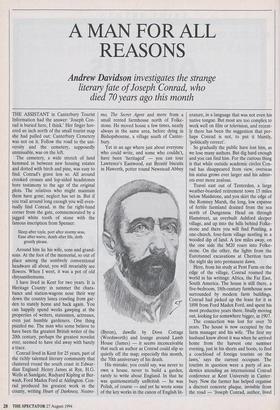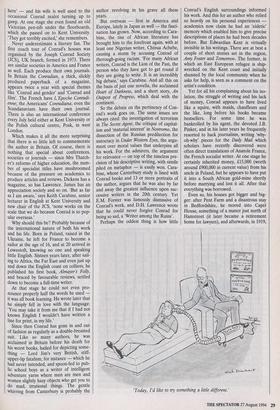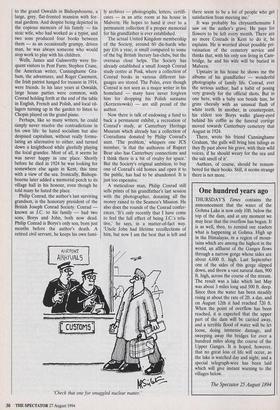A MAN FOR ALL REASONS
Andrew Davidson investigates the strange
literary fate of Joseph Conrad, who died 70 years ago this month
THE ASSISTANT in Canterbury Tourist Information had the answer: 'Joseph Con- rad is buried here, I think.' Her finger hov- ered an inch north of the small tourist map she had pulled out: Canterbury Cemetery was not on it. Follow the road to the uni- versity and the cemetery, supposedly unmissable, was on the left.
The cemetery, a wide stretch of land hemmed in between new housing estates and dotted with birch and pine, was easy to find. Conrad's grave less so. All around crooked crosses and lop-sided headstones bore testimony to the age of the original plots. The relatives who might maintain them have gone; neglect has set in. But if you trail around long enough you will even- tually find Conrad, in the far right-hand corner from the gate, commemorated by a jagged white tooth of stone with the famous inscription from Spenser:
Sleep after toyle, port after stormy seas, Ease after wane, death after life, doth greatly please.
Around him lie his wife, sons and grand- sons. At the foot of the memorial, so out of place among the sombrely conventional headware all about, you will invariably see flowers. When I went, it was a pot of old chrysanthemums.
I have lived in Kent for two years. It is Heritage County: in summer the chara- bancs and station-wagons nose their way down the country lanes crawling from gar- den to stately home and back again. You can happily spend weeks gawping at the properties of writers, statesmen, actresses, even just humble gardeners. One thing puzzled me. The man who some believe to have been the greatest British writer of the 20th century, perhaps the greatest novelist ever, seemed to have slid away with barely a trace.
Conrad lived in Kent for 25 years, part of the richly talented literary community that clustered round the south coast in Edwar- dian England: Henry James at Rye, H.G. Wells at Sandgate, Rudyard Kipling at Bur- wash, Ford Madox Ford at Aldington. Con- rad produced his greatest work in the county, writing Heart of Darkness, Nostro- mo, The Secret Agent and more from a small rented farmhouse north of Folke- stone. He moved house a few times, nearly always in the same area, before dying in Bishopsboume, a village south of Canter- bury.
Yet in an age where just about everyone who could write, and some who couldn't, have been `heritaged' — you can tour Lawrence's Eastwood, eat Brontë biscuits in Haworth, potter round Newstead Abbey (Byron), dawdle by Dove Cottage (Wordsworth) and lounge around Lamb House (James) — it seems inconceivable that such an author as Conrad could slip so quietly off the map; especially this month, the 70th anniversary of his death.
His mistake, you could say, was never to own a house, never to build a garden, rarely to write about England. In that he was quintessentially unBritish — he was Polish, of course — and yet he wrote some of the key works in the canon of English lit- erature, in a language that was not even his native tongue. But most are too complex to work well on film or television, and recent- ly there has been the suggestion that per- haps Conrad is not, to put it bluntly, `politically correct'.
So gradually the public have lost him, as we lose many authors. But dig hard enough and you can find him. For the curious thing is that while outside academic circles Con- rad has disappeared from view, overseas his status grows ever larger and his admir- ers ever more zealous.
Travel east out of Tenterden, a large weather-boarded retirement town 15 miles below Maidstone, and you skirt the edge of the Romney Marsh, the long, low expanse of fertile farmland drained from the sea north of Dungeness. Head on through Hamstreet, an overbuilt Ashford sleeper village, and up into the hills behind Folke- stone and there you will find Postling, a one-church, four-farm village nestling in a wooded dip of land. A few miles away, on the one side the M20 roars into Folke- stone. On the other, the lights from the Eurotunnel excavations at Cheriton turn the night sky into permanent dawn.
Here, from his study at Pent Farm on the edge of the village, Conrad roamed the world in his writings: Africa, the Far East, South America. The house is still there, a five-bedroom, 18th-century farmhouse now surrounded by modem farm buildings. Conrad had picked up the lease for it in 1898 from Ford Madox Ford, and spent his most productive years there, finally moving out, looking for somewhere bigger, in 1907.
The connection was lost for over 70 years. The house is now occupied by the farm manager and his wife. 'The first my husband knew about it was when he arrived home from the harvest one summer evening, just in his shorts and boots, to find a coachload of foreign tourists on the lawn,' says the current occupant. The tourists in question were a party of aca- demics attending an international Conrad conference at Kent University in Canter- bury. Now the farmer has helped organise a discreet concrete plaque, invisible from the road — 'Joseph Conrad, author, lived here' — and his wife is well used to the occasional Conrad zealot turning up to gawp. At one stage she even found an old Victorian pen-nib under the floorboards, which she passed on to Kent University. `They got terribly excited,' she remembers.
Never underestimate a literary fan. The first coach tour of Conrad's houses was organised by the Joseph Conrad Society (JCS), UK branch, formed in 1973. There are similar societies in America and France as well. Each produce their own journals. In Britain the Conradian, a thick, slickly produced paperback of a magazine, appears twice a year with special themes like `Conrad and gender' and 'Conrad and film'. The French have L'Epoche Conradi- enne; the Americans' Conradiana; even the Scandanavians have their own journal. There is also an international conference every July held either at Kent University or the Polish cultural centre, Posk, in west London.
Which makes it all the more surprising that there is so little left to commemorate the author in Britain. Of course, there is nothing that special about conferences, societies or journals — since Mrs Thatch- er's reforms of higher education, the num- ber of specialist titles have mushroomed because of the pressure on academics to produce articles and reviews. Dickens has a magazine, so has Lawrence. James has an appreciation society and so on. 'But as far as I am aware,' says Keith Carabine, senior lecturer in English at Kent University and new chair of the JCS, 'none works on the scale that we do because Conrad is so pop- ular overseas.'
Why should this be? Probably because of the international nature of both his work and his life. Born in Poland, raised in the Ukraine, he left for France to become a sailor at the age of 16, and at 20 arrived in Lowestoft, knowing no one and speaking little English. Sixteen years later, after sail- ing to Africa, the Far East and even just up and down the English coast on colliers, he published his first book, Almayer's and braced by favourable reviews, settled down to become a full-time writer.
At that stage he could not even pro- nounce properly half the words he used it was all book learning. He wrote later that he simply fell in love with the language: 'You may take it from me that if I had not known English I wouldn't have written a line for print, in my life.' Since then Conrad has gone in and out of fashion as regularly as a double-breasted suit. Like so many authors, he was acclaimed in Britain before his death for his worst books, hailed for depicting some- thing — Lord Jim's very British, stiff- upper-lip fatalism, for instance — which he had never intended, and spoon-fed to pub- lic school boys as a writer of intelligent adventure yarns where men are men and women slightly hazy objects who get you to do mad, irrational things. The gentle whirring from Canterbury is probably the author revolving in his grave all these years. But overseas — first in America and Europe, lately in Japan as well — the fasci- nation has grown. Now, according to Cara- bine, the rise of African literature has brought him to the forefront again, with at least one Nigerian writer, Chinua Achebe, causing a storm by accusing Conrad of thorough-going racism. 'For many African writers, Conrad is the Lion of the Past, the person who they have got to get round if they are going to write. It is an incredibly big debate,' says Carabine. And all this on the basis of just one novella, the acclaimed Heart of Darkness, and a short story, An Outpost of Progress, which deal with the continent.
So the debate on the pertinency of Con- rad's work goes on. The same issues are always cited: the investigation of terrorism in The Secret Agent, the critique of capital- ism and 'material interest' in Nostromo, the dissection of the Russian predilection for autocracy in Under Western Eyes, the argu- ment over moral values that underpins all his work. For the admirers, the argument for relevance — on top of the timeless pre- cision of his descriptive writing, with simile piled on metaphor — is easily won. Cara- bine, whose Canterbury study is lined with Conrad books and 13 or more portraits of the author, argues that he was also by far and away the greatest influence upon suc- cessive writers in the 20th century. Yet E.M. Forster was famously dismissive of Conrad's work, and D.H. Lawrence wrote that he could never forgive Conrad for being so sad, a 'Writer among the Ruins'. Perhaps the oddest thing is how little Conrad's English surroundings informed his work. And this for an author who relied so heavily on his personal experiences academics now claim he had an 'eidetic' memory which enabled him to give precise descriptions of places he had been decades before. But Edwardian Kent is virtually invisible in his writings. There are at best a couple of short stories set in the region, Amy Foster and Tomorrow. The former, in which an East European refugee is ship- wrecked on the Kent coast and initially shunned by the local community when he asks for help, is seen as a comment on the artist's condition.
Yet for all his complaining about his iso- lation, the struggle of writing and his lack of money, Conrad appears to have lived like a squire, with maids, chauffeurs and the like, long before his books became bestsellers. For some time he was bankrolled by his agent, the devoted J.B. Pinker, and in his later years he frequently resorted to hack journalism, writing 'why- oh-why' pieces for the Daily Mail which scholars have recently discovered were often direct translations of Anatole France, the French socialist writer. At one stage he certainly inherited money, £15,000 (worth around £900,000 in current value) from his uncle in Poland, but he appears to have put it into a South African gold-mine shortly before marrying and lost it all. After that everything was borrowed.
Even so, his houses got bigger and big- ger: after Pent Farm and a disastrous stay in Bedfordshire, he moved into Capel House, something of a manor just north of Hamstreet (it later became a retirement home for lawyers), and afterwards, in 1919, 'Today, I'd like to try something a little different.' to the grand Oswalds in Bishopsbourne, a large, grey, flat-fronted mansion with for- mal gardens. And despite being depicted in the copious memoirs of his family — his stoic wife, who had worked as a typist, and two sons produced four books between them — as an occasionally grumpy, driven man, he was always someone who would stop work to play with his children.
Wells, James and Galsworthy were fre- quent visitors to Pent Farm; Stephen Crane, the American writer, Cunninghame Gra- ham, the adventurer, and Roger Casement, the Irish patriot hanged for treason in 1914, were friends. In his later years at Oswalds, large house parties were common, with Conrad holding forth at the end of the table in English, French and Polish, and local vil- lagers turning up in the garden to listen to Chopin played on the grand piano.
Perhaps, like so many writers, he could simply never resolve the contradictions in his own life: he hated socialism but also despised capitalism, without really formu- lating an alternative to either, and turned down a knighthood while gleefully playing the local grandee. Most of all, it seems he was never happy in one place. Shortly before he died in 1924 he was looking for somewhere else again in Kent, this time with a view of the sea. Ironically, Bishops- bourne later added a memorial porch to its village hall in his honour, even though he told many he hated the place.
Philip Conrad, the author's last surviving grandson, is the honorary president of the British Joseph Conrad Society. Conrad known as J.C. to his family — had two sons, Borys and John, both now dead. Philip Conrad is Borys's only son, born just months before the author's death. A retired civil servant, he keeps his own fami- ly archives — photographs, letters, certifi- cates — in an attic room at his house in Malvern. He hopes to hand it over to a permanent collection if a proper memorial for his grandfather is ever established.
The actual United Kingdom membership of the Society, around 60 die-hards who pay £16 a year, is small compared to some of the big British literary fan-clubs, but the overseas clout helps. The Society has already established a small Joseph Conrad study centre at Posk, where a collection of Conrad books in various different lan- guages are stored. The Poles, even though Conrad is not seen as a major writer in his homeland — many have never forgiven him for dropping his Polish surname (Korzeniowski) — are still proud of the author.
Now there is talk of endowing a fund to back a permanent exhibit, a recreation of Conrad's study, at Canterbury Heritage Museum which already has a collection of Conradiana donated by Philip Conrad's aunt. 'The problem,' whispers one JCS member, 'is that the authoress of Rupert Bear also has Canterbury connections and I think there is a bit of rivalry for space.' But the Society's original ambition, to buy one of Conrad's old homes and open it to the public, has had to be abandoned. It is just too expensive.
A meticulous man, Philip Conrad still sells prints of his grandfather's last session with the photographer, donating all the money raised to the Seamen's Mission. He also does the rounds of the Conrad confer- ences. 'It's only recently that I have come to feel the full effect of being J.C.'s rela- tive,' he says, in a matter-of-fact way. `Uncle John had lifetime recollections of him, but now I am the best that is left and `Check that one for smuggled nuclear matter.' there seem to be a lot of people who get satisfaction from meeting me.'
It was probably his chrysanthemums I saw on the author's grave. He pays for flowers to be left every month. There are no more Conrads in Kent to do it, he explains. He is worried about possible pri- vatisation of the cemetery service and thinks that, with his only son living in Cam- bridge, he and his wife will be buried in Malvern.
Upstairs in his house he shows me the albums of his grandfather — wonderful photographs of family life. Conrad, ever the serious author, had a habit of posing very gravely for the official shots. But in one here, with a baby son beside him, he grins cheesily with an unusual flash of white teeth. In another, in counterpoint, his eldest son Borys walks glassy-eyed behind his coffin as the funeral cortege moved towards Canterbury cemetery that August in 1924.
There, wrote his friend Cunninghame Graham, 'the gulls will bring him tidings as they fly past above his grave, with their wild voices, if he should weary for the sea and the salt smell of it'.
Authors, of course, should be remem- bered for their books. Still, it seems strange there is not more.




























































 Previous page
Previous page